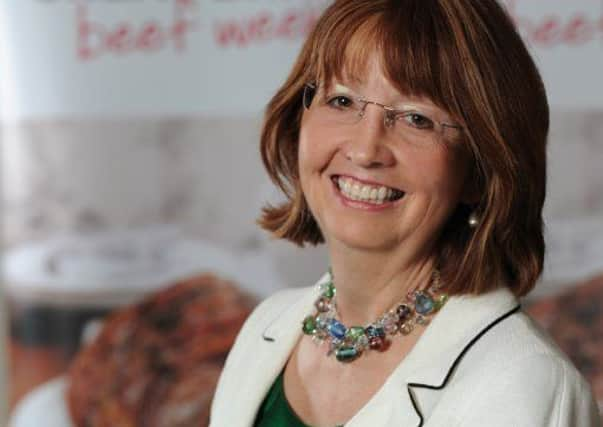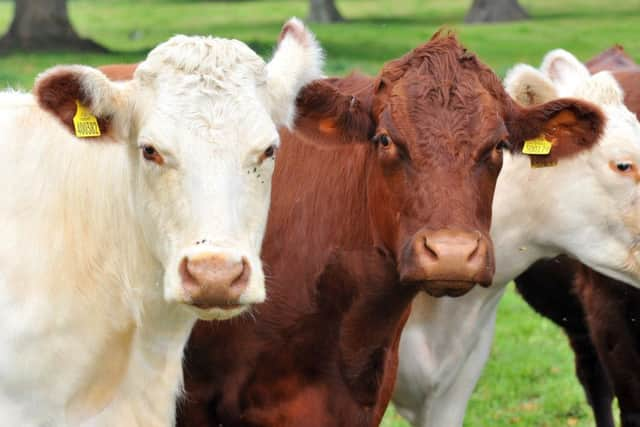‘Meat industry needs to find its voice to counter misinformation’


Jilly Greed, one of the organisers of Great British Beef Week, believes a more robust cross-industry response is needed to champion the health benefits of red meat and its environmental credentials, amid a highly organised mission to denigrate livestock production.
A report published this month for the EAT-Lancet Commission on Food, Planet, Health said a “planetary health diet”, requiring a shift from meat to vegetable consumption, was needed to protect the wellbeing of future generations and the planet.
Advertisement
Hide AdAdvertisement
Hide AdThe report was dismissed as “another example of well-intentioned but potentially flawed thinking on how we reduce our impact on the environment”, by the Agriculture and Horticulture Development Board (AHDB).


“Farming, in particular dairy and red meat, is part of the solution, making best use of naturally occurring assets to feed a growing population. They are an important nutritional part of a healthy, balanced diet,” reasoned Will Jackson, AHDB’s strategy director for beef and lamb.
He added: “Red meat contains an efficient package of essential nutrients important for the body. For this reason Government guidelines suggest we should have 70g of red meat a day. Average population intake in the UK is currently below this figure. Any suggestion that we should further reduce our intake could have unintended detrimental consequences on health.”
The rebuttal was hailed by Ms Greed who wants the industry to use on the forthcoming Great British Beef Week which starts on April 1 to set the record straight on red meat.
Advertisement
Hide AdAdvertisement
Hide AdSpeaking to The Yorkshire Post, Ms Greed, co-founder of Ladies in Beef, said: “It was absolutely right that AHDB responded as it did with a science-based focus, that’s the lead that we need to take and there needs to be a continuing campaign because it’s not just about Veganuary.”
Campaigns such as Veganuary are encouraging people to reduce their meat intake. According to The Vegan Society, the number of vegans in Britain last year was around 600,000, a four-fold increase since 2014, though still only a tiny minority (1.16 per cent) of the population.
Anti-meat activists were criticised this week after an interactive online map was published showing the locations of hundreds of dairy farms in England and Wales.
Created by Project Calf, the map is part of a campaign by the organisation to purportedly expose unsavoury practices within the dairy industry.
Advertisement
Hide AdAdvertisement
Hide Ad“That’s pretty nasty,” said Ms Greed, who farms 200 suckler beef cows and young stock in Devonshire.
“They are trying to make out that’s legitimate surveillance but it isn’t at all. It amounts to trespass and intimidation if they go onto farms.”
Social media is “a mixing pot of completely inaccurate facts” about meat production, she said, and it was time for the industry to stop feeling intimidated and collaborate to counter false information.
She said: “It’s so important for the farming industry to counter this. It needs a stronger collaborative approach. Farmers aren’t the most natural communicators but bringing organisations together could trigger strong responses.”
Advertisement
Hide AdAdvertisement
Hide AdA heighten level of response was now needed, she said, because of the organised tactics of activists.
“This group are highly accomplished communicators using social media and that have a mission to change the world - and we are fragmented and intimidated.”
Research by Waitrose, published in its 2018 Food and Drink Report, suggested that the top reasons people gave for becoming vegan or vegetarian were animal welfare concerns, health benefits and fears about environmental impacts of eating meat.
The impact of beef production on the environment is “completely misunderstood”, Ms Greed said.
Advertisement
Hide AdAdvertisement
Hide Ad“Part of the problem is that we’re not explaining properly grass produced suckler beef systems. Almost half - 47 per cent - of the UK’s many breeds of cattle are managed on our mountains, moorlands, marshlands and wetland meadows that you can’t grow anything else on and it’s a carbon sink, we are not banging the drum enough on that.
“We know beef is high in iron and protein and zinc but one key thing we don’t bang on about enough is vitamin B12. It’s critically important in terms of our blood and can’t be found naturally in plants and conventional vegetables.
“We are storing up health issues for the future for young people who adopt a vegan diet without understanding what they are replacing meat with and what they need to have to have healthy bones, brain and immune system.”
INTIMIDATION
Jilly Greed said she “completely understands” why some in farming do not confront misinformation circulated by anti-meat activists.
Advertisement
Hide AdAdvertisement
Hide AdReflecting on her own experiences, she said: “I get invited to go on various live media roundtables and you realise you are actually being put up for fodder.
“We need to go direct to consumers using stakeholders to collaborate because sometimes you are dealing with fanatics who don’t even want to hear your point of view. We can be more proactive and that’s one of the aims of Great British Beef Week.”